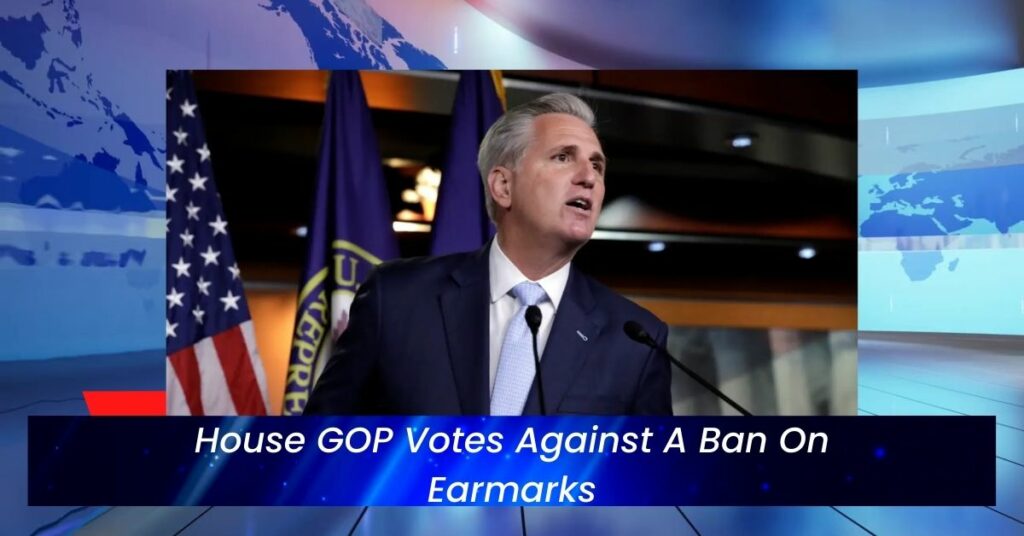Earmarks will be around for at least one more Congress. During a conference rules meeting on Wednesday, House Republicans voted against a plan to ban earmarks. This vote was important because House Minority Leader Kevin McCarthy wants to be the speaker.
Rep. Tom McClintock, R-Calif., proposed an amendment that would get rid of the current conference rule that lets members put their names on spending bills as long as they meet certain transparency criteria. The conference voted 52-158 against this amendment. A GOP aide gave a summary of the vote behind closed doors and said that one member did not vote. Before the vote, longtime Republican appropriators made sure to say that they supported the practice.
Rep. Steve Womack, a Republican from Arkansas, said earlier this month that the current process has enough transparency rules and lets Congress use its constitutional right to keep an eye on how much money the government spends.
He said, “For the next two years, we’ll have a Democratic Senate and a Democratic White House.” “I don’t think it’s smart for Congress to give all of its power to the executive branch. It’s giving up our job of keeping spending in check.”
House Freedom Caucus Chairman Scott Perry, R-Pa., said in a short interview Wednesday before the conference vote that getting rid of earmarks would be a “pretty important marker” for conservatives deciding whether to vote for McCarthy as speaker in a floor vote on January 3.
Perry said, “Look, we get that it’s complicated, and we agree that Congress should have a lot of control over spending and not just give that power to the executive branch.” “At the same time, it’s denying reality not to acknowledge the coercive and corrosive power of earmarks and the dealmaking that goes along with them.”
The press has asked. Nothing from @GOPLeader McCarthy. You should conclude from his silence that Kevin supports White Supremacists. There’s no other logical conclusion to draw. cc: @NewsHour pic.twitter.com/A54s994a2f
— Rep. Eric Swalwell (@RepSwalwell) November 29, 2022
Perry and some of his Freedom Caucus colleagues met with McCarthy behind closed doors on Tuesday to talk about changes to the rules they want. So far, McCarthy has only agreed to “minutiae,” Perry said.
“Sadly, we don’t see that there’s a problem with the way earmarks work in Washington, D.C.,” he said. “America knows that this system is broken and that their hard-earned money is being wasted on things that have nothing to do with the federal government.”
Before Thanksgiving, the conference voted down other amendments proposed by Freedom Caucus members. These included letting committees choose their chairs instead of the Republican Steering Committee and requiring the Republican leader to make passing the 12 appropriations bills as separate measures a top priority.
McCarthy said he won’t try to change the outcome of the conference’s vote on whether or not to ban earmarks again. But he needs 218 votes to become a speaker. At the conference vote earlier this month, he fell short by 30 votes.
At the start of the 117th Congress, when it became clear that Democrats would bring back earmarks, which are now called “congressionally directed spending,” the GOP Conference passed the rule. At the time, the margin was close, but over the past two years, earmarks have become more popular, and now more than half of the conference is looking for local projects for their constituents.
Rosa DeLauro, D-Connecticut, is the chair of the House Appropriations Committee. She brought back the practice, but with more rules about how it can be used and a cap of 1 percent of annual discretionary spending. Still, there is a large and loud group in the conference that is against earmarks, so a vote on McClintock’s amendment was put off until after Thanksgiving so that members could have more time to think about it.
In an opinion piece published last week in the Washington Times, McClintock said, “The new Republican majority needs to make a dramatic, concrete, and credible statement that business as usual in Washington is over.” “Is there a more powerful statement it can make than to say it won’t do earmarking, which is wasteful and corrupt?”
Since the rule change discussion started earlier this month, conservative activists have been working hard to get Republicans to support the amendment. In a letter to House GOP lawmakers on Tuesday, several groups, including the Club for Growth, Americans for Tax Reform, FreedomWorks, National Taxpayers Union, Heritage Action, Citizens Against Government Waste, and more, said that earmarks are one of the most corrupt, unfair, and wasteful things Congress has ever done.
“Supporting Rep. McClintock’s amendment is your first chance to show taxpayers that if Republicans win a majority in the House, they will work hard to restore and keep fiscal responsibility.”
If you enjoyed reading our article, I’d appreciate a share. If so, we’d love to hear your insights below. If you want to keep up with this kind of news, you should add Journalistpr.com. to your favorites.

